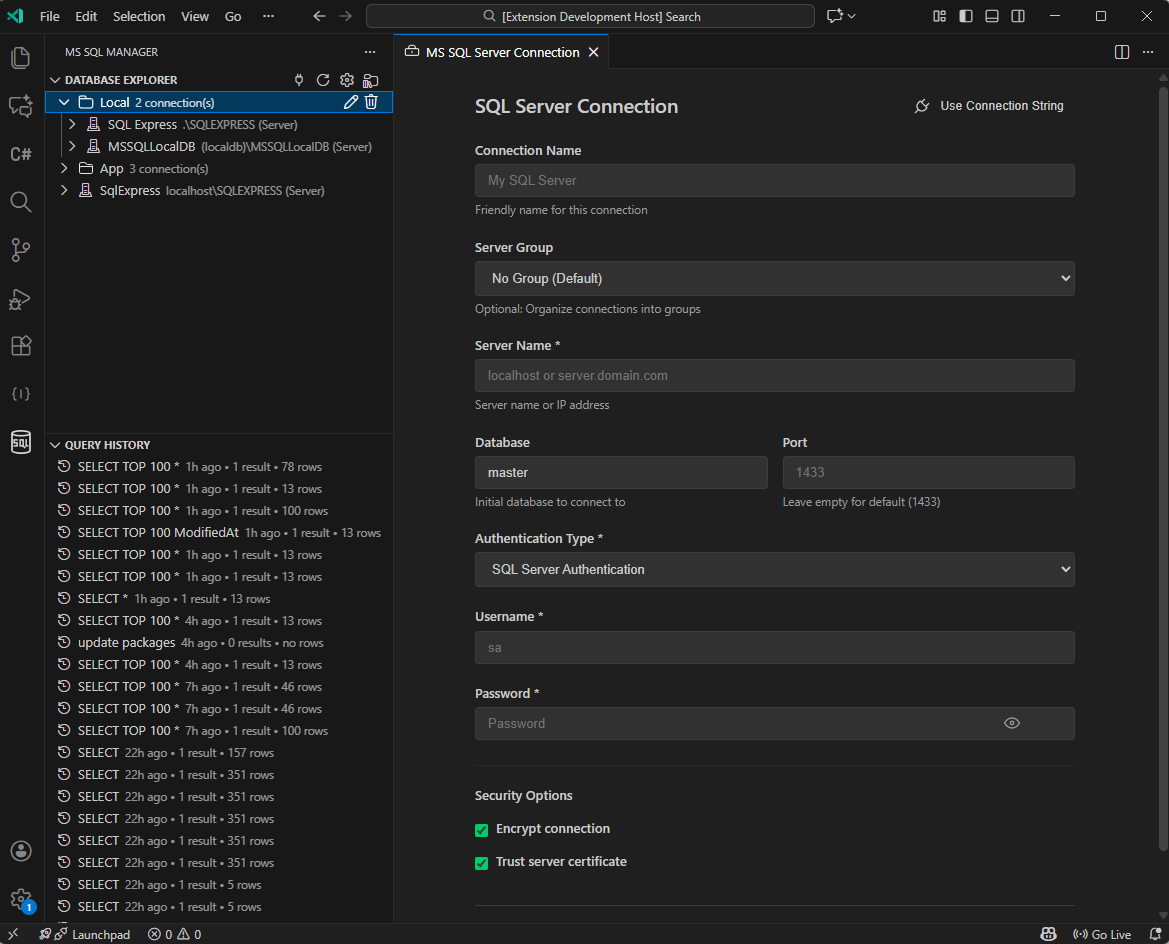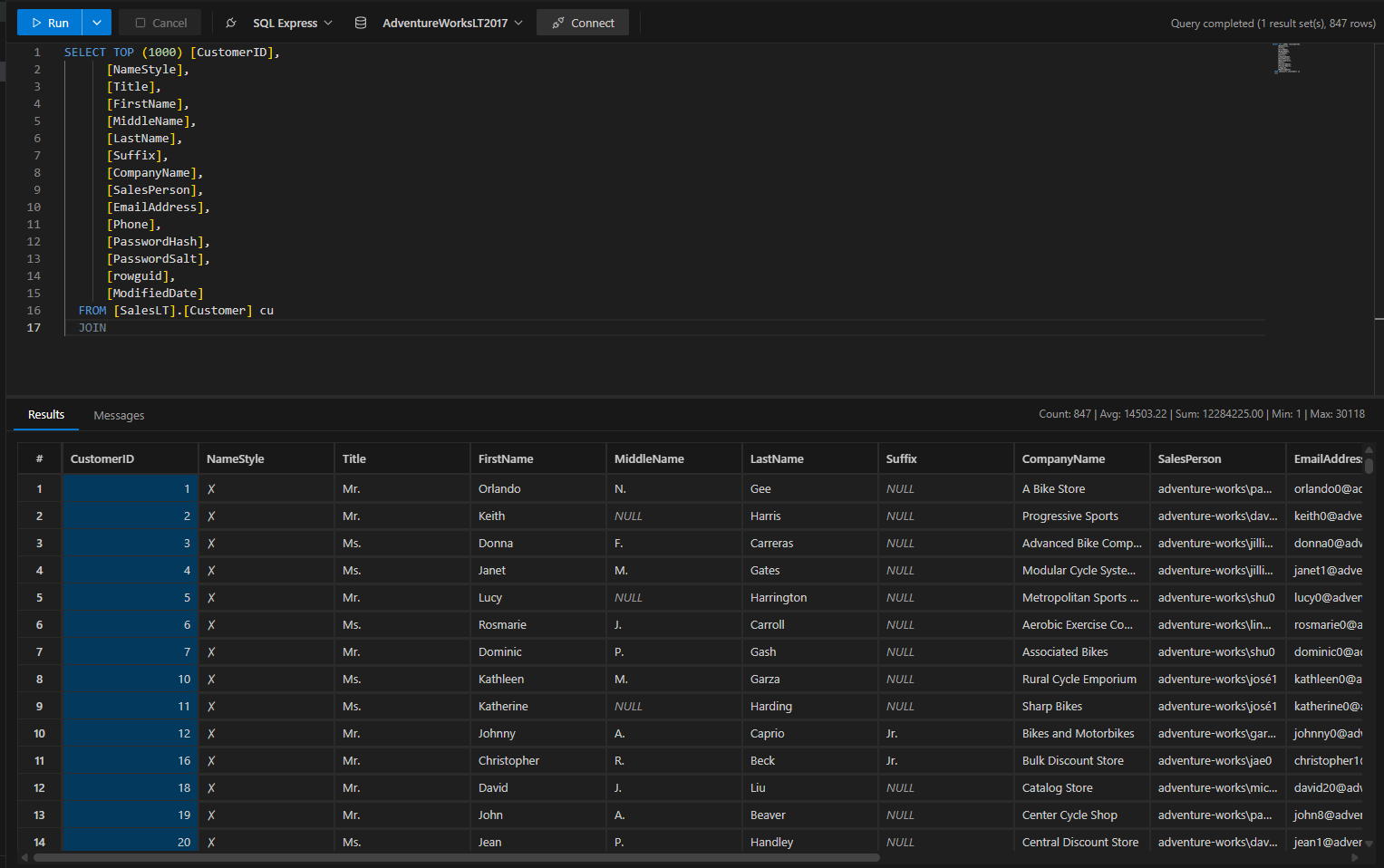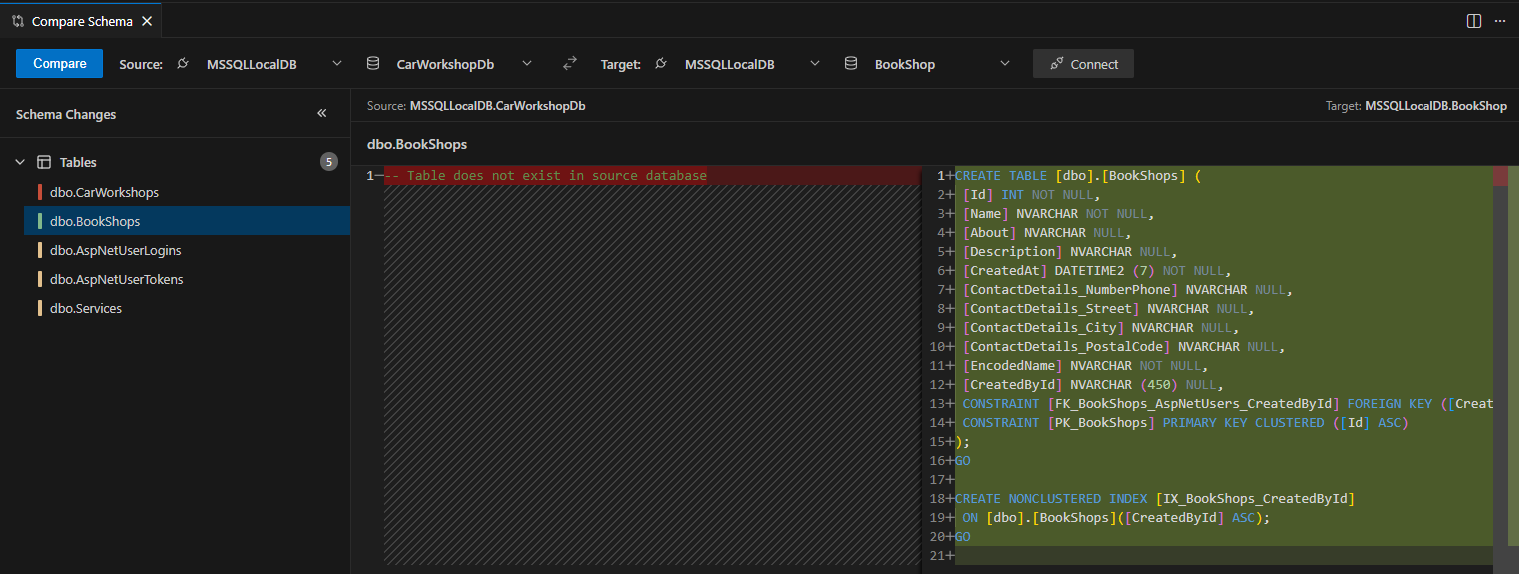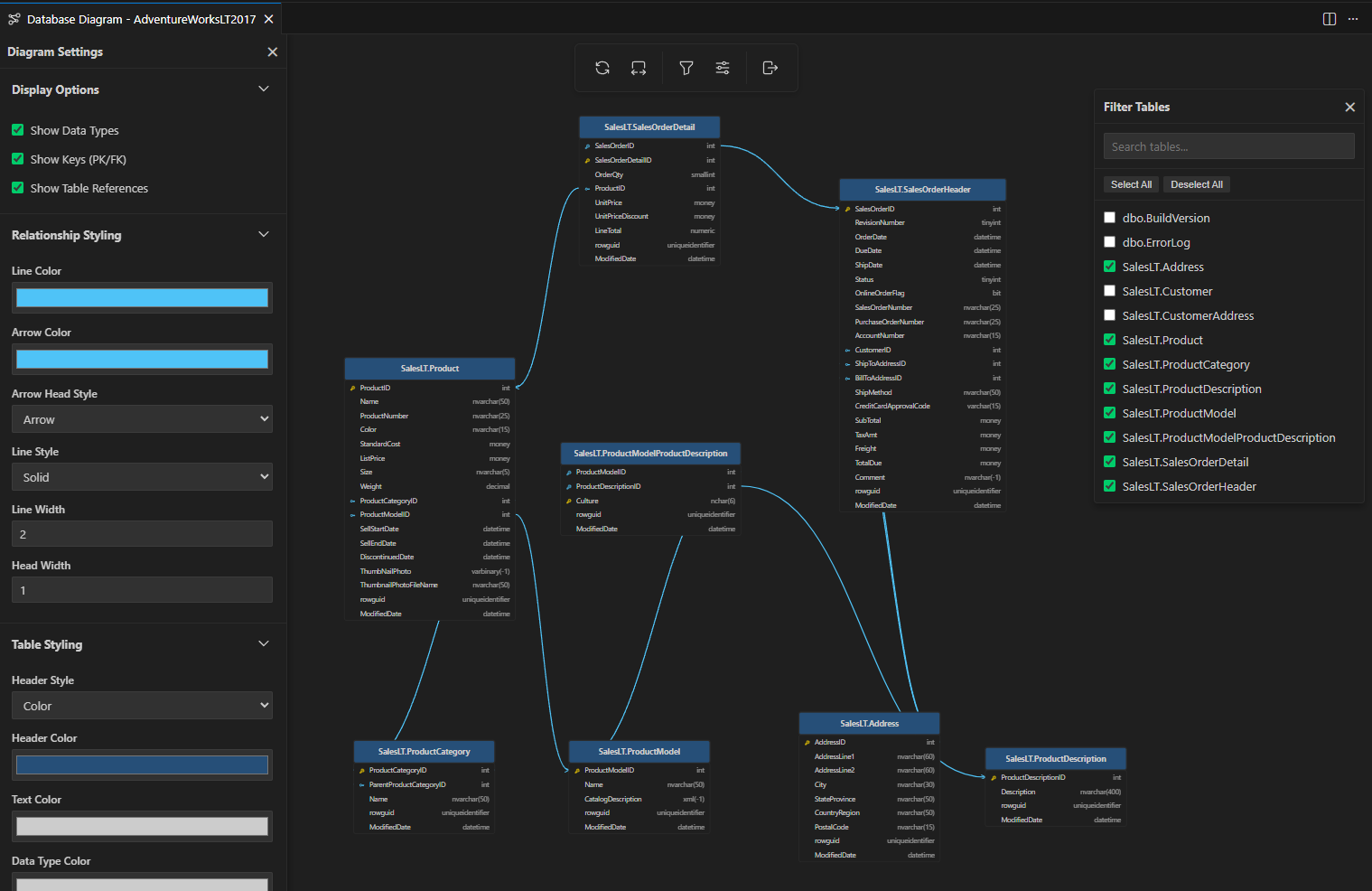MS SQL Manager for VS Code
A comprehensive VS Code extension for managing Microsoft SQL Server databases with connection management, schema browsing, and query execution capabilities.
Features
🔌 MS SQL Server Connection
Comprehensive connection management system for Microsoft SQL Server databases with support for multiple authentication methods and connection profiles.

Key Features:
- Interactive Connection Form: Dedicated webview form for creating and testing connections
- Multiple Authentication Types: SQL Server Authentication, Windows Authentication, and Azure AD
- Connection Profiles: Save and reuse connection configurations securely
- Server Groups: Organize connections into logical groups for better management
- Connection Testing: Validate connections before saving them
- Secure Credential Storage: Passwords handled securely without permanent storage
☁️ Azure SQL Discovery
Automated discovery and connection setup for Azure SQL servers with intelligent authentication guidance.
Key Features:
- Server-Level Connections: Creates connections to Azure SQL servers (not specific databases)
- Admin Login Discovery: Automatically discovers and pre-fills SQL Server administrator usernames
- Database Enumeration: Lists all available databases per server in connection metadata
- Startup Integration: Automatically discovers Azure resources when extension loads
- Manual Discovery: On-demand discovery via "Azure: Discover SQL Servers" command
⚡ SQL Runner
Advanced SQL query execution engine with comprehensive T-SQL support and real-time results display.

Key Features:
- Enhanced SQL Editor: Custom editor with syntax highlighting for
.sql files
- Flexible Execution: Run selected text, current statement, or entire file
- GO Statement Support: Proper handling of batch separators
- Query History: Track, organize, and rerun previous queries with pin/unpin functionality
- Real-time Progress: Live execution progress and performance metrics
- Results Export: Export query results to CSV format
- Keyboard Shortcuts: Execute with F5 or Ctrl+Shift+E
🔍 Schema Compare
Professional schema comparison tool for analyzing differences between database structures and generating synchronization scripts.

Key Features:
- Side-by-side Comparison: Visual comparison of database schemas
- Object-level Analysis: Compare tables, views, stored procedures, and functions
- Difference Highlighting: Clear visualization of schema differences
- Synchronization Scripts: Generate T-SQL scripts to synchronize schemas
- Selective Sync: Choose which objects to include in synchronization
- Cross-database Support: Compare schemas across different databases
📊 Database Diagrams
Interactive database visualization tool for understanding table relationships and database structure.

Key Features:
- Interactive Diagrams: Visual representation of database tables and relationships
- Relationship Mapping: Automatic detection and display of foreign key relationships
- Zoom and Pan: Navigate large database schemas with ease
- Table Details: View column information, data types, and constraints
- Export Options: Save diagrams for documentation purposes
- Real-time Updates: Diagrams reflect current database structure
📝 Generate SQL Scripts
Comprehensive script generation system for creating T-SQL scripts for various database operations.

Key Features:
- Object Scripting: Generate CREATE, ALTER, and DROP scripts for database objects
- Stored Procedure Management: Complete lifecycle management with script generation
- Data Export Scripts: Generate INSERT scripts with data
- Batch Operations: Script multiple objects simultaneously
- Flexible Output: Send scripts to new editor, file, or clipboard
- Template Support: Customizable script templates for consistent formatting
Usage
Connecting to SQL Server
Open the MS SQL Manager panel in the sidebar (database icon)
Click the "Connect" button (plug icon) in the Schema Explorer
This opens a dedicated connection form with the following features:
- Server Configuration: Enter server name, database, and port
- Authentication Options: Choose between SQL Server, Windows, or Azure AD authentication
- Security Settings: Configure encryption and certificate trust options
- Connection Testing: Test your connection before saving
- Save for Reuse: Optionally save the connection profile for future use
Test Connection: Click "Test Connection" to verify your settings work
Save Connection: Once tested successfully, save the connection
The form will close and your connection will be active
Managing Saved Connections
- Click the gear icon (⚙️) in the Schema Explorer to manage connections
- Quick Connect: Select from previously saved connections
- Create New: Add new connection profiles
- Password Prompts: For SQL authentication, passwords are requested each time
Browsing Schema
Once connected, the Schema Explorer will show:
- 📂 Your server instance
- 📂 Connected database
- 📁 Object type folders (Tables, Views, Stored Procedures, Functions)
- 📄 Individual database objects
Executing Queries
- Create or open a
.sql file
- Write your T-SQL query
- Execute using one of these methods:
- Click the "Execute Query" button (play icon) in the editor toolbar
- Use the command palette:
MS SQL Manager: Execute Query
- Select text and execute only the selection
Viewing Results
Query results appear in a dedicated webview panel with features:
- Sortable columns: Click column headers to sort
- Data type handling: Numbers right-aligned, NULL values styled
- Export capability: Export results to CSV format
- Performance metrics: View execution time and row counts
Managing Connections
- Save connections: Choose to save connection profiles for reuse
- Quick connect: Select from previously saved connections
- Disconnect: Use the disconnect button to close active connections
- Status monitoring: Check connection status in the status bar
Extension Commands
| Command |
Description |
MS SQL Manager: Connect to Database |
Open connection form in webview |
MS SQL Manager: Execute Query |
Execute SQL query from active editor |
MS SQL Manager: Manage Connections |
Manage saved connection profiles |
MS SQL Manager: Refresh |
Refresh schema explorer |
Generate SELECT Script |
Create SELECT statement for selected table |
Architecture
The extension is built with a modular architecture:
extension.ts: Main entry point and command registrationconnectionProvider.ts: Handles SQL Server connections and authenticationschemaTreeProvider.ts: Implements the tree view for database schemaqueryExecutor.ts: Manages T-SQL query execution and error handlingresultWebview.ts: Custom webview for displaying query resultswebview/resultView.html: HTML/CSS/JS for the results interface
Requirements
- VS Code 1.105.0 or higher
- Node.js and npm for development
- Access to Microsoft SQL Server instance
For Azure SQL Discovery
- Azure CLI: Install and configure Azure CLI (
az login)
- Azure Access: Valid Azure subscription with SQL Server resources
- Permissions: Read access to Azure SQL resources in your subscriptions
Dependencies
- mssql: Microsoft SQL Server client for Node.js
- @types/mssql: TypeScript definitions for mssql package
Development
To develop and extend this extension:
- Clone the repository
- Install dependencies:
npm install
- Start the watch compiler:
npm run watch
- Press
F5 to launch the Extension Development Host
- Make changes and reload the window to test
Security Notes
- Passwords are never stored permanently
- Connections use encrypted channels by default
- Credentials are only held in memory during active sessions
- All database operations use parameterized queries where applicable
Troubleshooting
Connection Issues
- Verify SQL Server is running and accessible
- Check firewall settings and port availability (default: 1433)
- Ensure proper authentication credentials
- Review VS Code Output panel for detailed error messages
Query Execution Problems
- Verify you're connected to a database
- Check query syntax in SQL Server Management Studio
- Review timeout settings for long-running queries
- Check the Output channel for detailed error information
Contributing
This extension is built following VS Code extension best practices:
- TypeScript for type safety
- Modular architecture for maintainability
- Comprehensive error handling
- User-friendly interfaces
- Secure credential management
License
This project is provided as-is for educational and development purposes.






